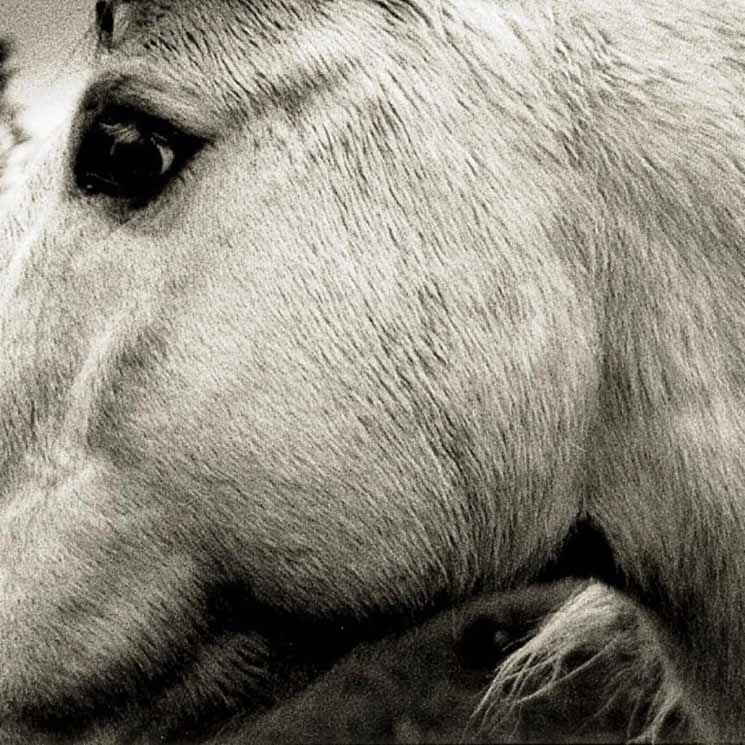Bonny Light Horseman came together like magic, so it only makes sense that their music feels like alchemy.
Anaïs Mitchell, Josh Kaufman and Eric D. Johnson officially formed as a band after a chance booking at Aaron Dessner and Justin Vernon's Eaux Claires festival in 2018. The trio come from equally impressive and diverse backgrounds: Mitchell is the mastermind behind Tony Award-winning musical Hadestown; Eric D. Johnson's claim to fame is his '00s band, Fruit Bats; and of course, Kaufman — among many things — is a collaborator of the legendary Bob Weir of the Grateful Dead, and even co-produced 2016's Day of the Dead, a charity covers compilation from the National's Bryce and Aaron Dessner.
These many influences tangle in blissful harmony on the group's self-titled debut, and make for a dynamic blend of contemporary and traditional English Isles folk, with some songs' origins dating back hundreds of years and others co-written by the trio as recently as 2019. The ensuing body of work is an honourable testament to the scope of the genre, using the lens of tradition to carve out a path for the future of folk.
Titular album opener "Bonny Light Horseman" (featuring a seductive tenor sax) was the inspiration behind the band's name — not the other way around. Based on a 19th century English-Irish folk ballad, the song tells the story of a handsome soldier who may never return home. The band found the song "emblematic" of what they were trying to accomplish within the group, calling it a tune that makes you "feel something — no matter what century you're in."
And that it does. So do the following two tracks, "Deep In Love," which originated as a Fruit Bats sketch, and the Mitchell-led "The Roving," about the end days of a romantic relationship. Deeply rooted in universal human experience, the variety and scope of these tracks lend themselves to the timelessness they set out to underscore.
Midway through Bonny Light Horseman, we really begin to hear Kaufman's influence in "Magpie's Nest," "Blackwaterside" and "Lowlands," a string of Dead-tinged tracks that feature poignant lyrics like "the sun rose in the west" (an expression commonly used in folk tradition to signify "never") and "I lay me down to rest." These are, of course, both lines the Dead themselves incorporate in their catalogue from time to time. For Bonny Light Horseman, though, these songs are a direct nod to the record's transatlantic history. But it's no mere reenactment: in ten too-short tracks, the band's debut shines with its globalist/modernist touches. Symbolically, the bulk of the album was recorded in Europe before it made its way to Wisconsin.
Bonny Light Horseman's eponymous debut is rich in folk history and offers a fresh take on centuries-old traditions. For trad-folk fans who like to dig deep, this record is a perfect launching point — there are endless avenues of history to be found here.
(37d03d)Anaïs Mitchell, Josh Kaufman and Eric D. Johnson officially formed as a band after a chance booking at Aaron Dessner and Justin Vernon's Eaux Claires festival in 2018. The trio come from equally impressive and diverse backgrounds: Mitchell is the mastermind behind Tony Award-winning musical Hadestown; Eric D. Johnson's claim to fame is his '00s band, Fruit Bats; and of course, Kaufman — among many things — is a collaborator of the legendary Bob Weir of the Grateful Dead, and even co-produced 2016's Day of the Dead, a charity covers compilation from the National's Bryce and Aaron Dessner.
These many influences tangle in blissful harmony on the group's self-titled debut, and make for a dynamic blend of contemporary and traditional English Isles folk, with some songs' origins dating back hundreds of years and others co-written by the trio as recently as 2019. The ensuing body of work is an honourable testament to the scope of the genre, using the lens of tradition to carve out a path for the future of folk.
Titular album opener "Bonny Light Horseman" (featuring a seductive tenor sax) was the inspiration behind the band's name — not the other way around. Based on a 19th century English-Irish folk ballad, the song tells the story of a handsome soldier who may never return home. The band found the song "emblematic" of what they were trying to accomplish within the group, calling it a tune that makes you "feel something — no matter what century you're in."
And that it does. So do the following two tracks, "Deep In Love," which originated as a Fruit Bats sketch, and the Mitchell-led "The Roving," about the end days of a romantic relationship. Deeply rooted in universal human experience, the variety and scope of these tracks lend themselves to the timelessness they set out to underscore.
Midway through Bonny Light Horseman, we really begin to hear Kaufman's influence in "Magpie's Nest," "Blackwaterside" and "Lowlands," a string of Dead-tinged tracks that feature poignant lyrics like "the sun rose in the west" (an expression commonly used in folk tradition to signify "never") and "I lay me down to rest." These are, of course, both lines the Dead themselves incorporate in their catalogue from time to time. For Bonny Light Horseman, though, these songs are a direct nod to the record's transatlantic history. But it's no mere reenactment: in ten too-short tracks, the band's debut shines with its globalist/modernist touches. Symbolically, the bulk of the album was recorded in Europe before it made its way to Wisconsin.
Bonny Light Horseman's eponymous debut is rich in folk history and offers a fresh take on centuries-old traditions. For trad-folk fans who like to dig deep, this record is a perfect launching point — there are endless avenues of history to be found here.
